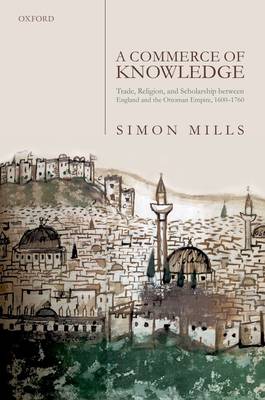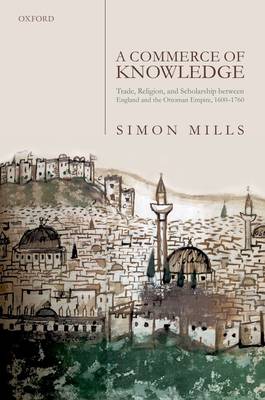
En raison d'une grêve chez bpost, votre commande pourrait être retardée. Vous avez besoin d’un livre rapidement ? Nos magasins vous accueillent à bras ouverts !
- Retrait gratuit dans votre magasin Club
- 7.000.000 titres dans notre catalogue
- Payer en toute sécurité
- Toujours un magasin près de chez vous
En raison de la grêve chez bpost, votre commande pourrait être retardée. Vous avez besoin d’un livre rapidement ? Nos magasins vous accueillent à bras ouverts !
- Retrait gratuit dans votre magasin Club
- 7.000.0000 titres dans notre catalogue
- Payer en toute sécurité
- Toujours un magasin près de chez vous
Commerce of Knowledge
Trade, Religion, and Scholarship Between England and the Ottoman Empire, 1600-1760
Simon Mills
Livre relié | Anglais
209,45 €
+ 418 points
Description
A Commerce of Knowledge tells the story of three generations of Church of England chaplains who served the English Levant Company in Syria during the seventeenth and eighteenth centuries. Reconstructing the careers of its protagonists in the cosmopolitan city of Ottoman Aleppo, Simon Mills investigates the links between English commercial and diplomatic expansion, and English scholarly and missionary interests: the study of Middle-Eastern languages; the exploration of biblical and Greco-Roman antiquities; and the early dissemination of Protestant literature in Arabic. Early modern Orientalism is usually conceived as an episode in the history of scholarship. By shifting the focus to Aleppo, A Commerce of Knowledge brings to light the connections between the seemingly separate worlds, tracing the emergence of new kinds of philological and archaeological enquiry in England back to a series of real-world encounters between the chaplains and the scribes, booksellers, priests, rabbis, and sheikhs they encountered in the Ottoman Empire. Setting the careers of its protagonists against a background of broader developments across Protestant and Catholic Europe, Mills shows how the institutionalization of English scholarship, and the later English attempt to influence the Eastern Christian churches, were bound up with the international struggle to establish a commercial foothold in the Levant. He argues that these connections would endure until the shift of British commercial and imperial interests to the Indian subcontinent in the second half of the eighteenth century fostered new currents of intellectual life at home.
Spécifications
Parties prenantes
- Auteur(s) :
- Editeur:
Contenu
- Nombre de pages :
- 354
- Langue:
- Anglais
Caractéristiques
- EAN:
- 9780198840336
- Date de parution :
- 09-03-20
- Format:
- Livre relié
- Format numérique:
- Genaaid
- Dimensions :
- 155 mm x 239 mm
- Poids :
- 680 g

Les avis
Nous publions uniquement les avis qui respectent les conditions requises. Consultez nos conditions pour les avis.






